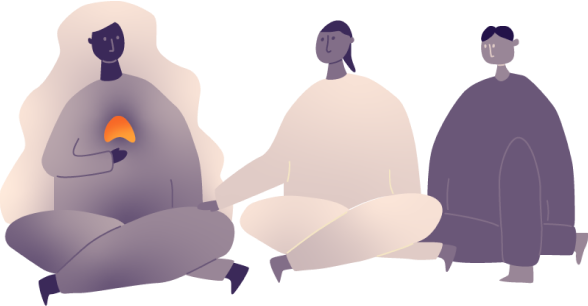Awhi is still in development, we'd love your feedback and suggestions. Let us know.
A Guide to Good and Bad Touching for disabled children
Just as children need to learn safety skills for crossing the road, they also need to learn basic rules around body boundaries and consent.
For disabled children and children who are neurodivergent, this is especially important as they are more at risk than their peers. A lack of knowledge and understanding about what is acceptable behaviour when receiving or giving physical affection when children are young can be dangerous.
Daily reinforcement of basic safety, done in a way that is fun, useful, and appropriate to their ability to understand is the best way to teach your child. You can also model good touching and respect for body boundaries which will help them manage the tricky does and don’ts of physical interactions.
An easy example is reminding children not to hug someone without their permission or to close the door when they go to the toilet.
Top Tips
Private parts are private
Any part of your body that is covered by your togs or undies, is for you to see only. If anyone asks to see your private parts - your penis, bottom, breasts or vulva, or wants to show you theirs - say ‘No’ loudly. Then go away quickly and find a grown-up you trust to tell them about it.
You get to decide what happens with your body
If you don’t want to hug someone or give them a kiss, even if it’s grandma or your best friend at school, you don’t have to. And they should always ask your permission first.
Other people’s bodies are theirs too
Just as you get to say what happens with your body, your friends and your family do as well. If you want to hold someone’s hand or tickle them, remember to ask first.
Some things are only okay when we’re alone
It’s fine to touch your penis, bottom, breasts or vulva but it’s a private thing.
Find an adult if you’re ever confused or worried about the way someone touches you or talks to you.
If the first grown-up you tell is too busy to listen, find another grown-up who can listen to you. Keep going until someone does listen.
There are no secrets.
Don’t listen if someone tells you something is a secret – it just means they don’t want to get into trouble. Always tell a parent or an adult you trust.
Understanding these simple rules, will empower your child to make good choices, boost their self-esteem and most importantly, help keep them safe.
Top tips for parents:
Don’t let feelings of embarrassment stop you from talking about good and bad touching. By staying calm, open and supportive, your children will know they can talk to you about anything.
Make sure your children know the proper words for their genitals as soon as possible. It makes communication easier on a topic that sometimes can be tricky to talk about.
Make sure anyone who interacts with your child knows they should **ask for permission **first before initiating physical interaction.
The more that everyone in your child’s community – at home and at school – agree on rules around consent and boundaries, the safer your child will be.
Encourage your child to** keep using these skills** every day and check in with them to see how things are going.
Never respond to a child’s disclosure of inappropriate touching with anger or obvious upset, this will discourage them from sharing information with you in the future.
Keep the focus on staying safe, rather than on the bad things that can happen.
Let your child know that even if you are tired, busy or grumpy** you will _always _listen** to them.
Reinforce the number one rule of saying ‘No’ to any touch they don’t like and telling an adult they trust about it.
To find out more about this important topic, contact the** IHC Library** on **0800 442 442 **or email librarian@ihc.org.nz. **IHC Library **has heaps of kids’ books, which are an invaluable tool to read through with your children to start up some of those crucial conversations.
Resources
Safety and Consent for Kids and Teens with Autism or Special Needs :
Safety and Consent for Kids and Teens with...
"The developmental challenges of children with special needs means...
"The developmental...
Safety and consent for kids and teens with autism or special needs :
Safety and consent for kids and teens with...
"The developmental challenges of children with special needs means...
"The developmental...
The choices game
The choices game
"Designed to help older children and teenagers stay safe by...
"Designed to help older...
Too close, too far, just right :
Too close, too far, just right :
Designed to help children understand the concept of personal space.
Designed to help children...

Resources for kids
Amazing you :
Amazing you :
Presents clear and age-appropriate information about reproduction,...
Presents clear and...
Ask first, monkey! :
Ask first, monkey! :
"Meet Monkey. Tickletastic Monkey. He's the best tickler in the...
"Meet Monkey. Tickletastic...
Ask first, monkey! :
Ask first, monkey! :
"Meet Monkey. Tickletastic Monkey. He's the best tickler in the...
"Meet Monkey. Tickletastic...
Bobby and Mandee's good touch, bad touch /
Bobby and Mandee's good touch, bad touch /
Introduces the topic of sexual abuse, and how children can protect...
Introduces the topic of...
C is for Consent /
C is for Consent /
As "Finn navigates a gathering of relatives and friends, his...
As "Finn navigates a...
Consent :
Consent :
A child who has learned all about their body boundary and that they...
A child who has learned all...
Don't Hug Doug (he doesn't like it) /
Don't Hug Doug (he doesn't like it) /
Meet Doug, an ordinary kid who doesn't like hugs, in this fun and...
Meet Doug, an ordinary kid...
Harrison Spader, personal space invader /
Harrison Spader, personal space invader /
"Harrison P. Spader sat a little too close. Shook hands a little...
"Harrison P. Spader sat a...
It's my body :
It's my body :
Your body is amazing! It can move, grow and heal as well as help...
Your body is amazing! It...
Kidpower safety comics :
Kidpower safety comics :
Even if your kids are not big yet, they have big powers. Mouth...
Even if your kids are not...
Let's talk about body boundaries, consent & respect :
Let's talk about body boundaries, consent...
Teaching young children about body boundaries, both theirs and...
Teaching young children...
Miles is the boss of his body /
Miles is the boss of his body /
"On his 6th birthday, Miles's excitement is dimmed when he finds...
"On his 6th birthday,...
My body belongs to me :
My body belongs to me :
"Without being taught about body boundaries, a child may be too...
"Without being taught about...
My body! what I say goes! :
My body! what I say goes! :
"The crucial skills taught in this book will help children to...
"The crucial skills taught...
My underpants rule! /
My underpants rule! /
A fun, easy way to teach children how to protect their private...
A fun, easy way to teach...
Personal Space Camp /
Personal Space Camp /
Although Louis knows a lot about outer space, the young boy finds...
Although Louis knows a lot...
Private parts are private /
Private parts are private /
Private Parts are Private reinforces the correct anatomical names...
Private Parts are Private...
Respect :
Respect :
Your body belongs to you and you get to set your own rules, so that...
Your body belongs to you...
Body safety book for kids /
Body safety book for kids /
Nina experiences an invasion of her personal space and decides what...
Nina experiences an...
.jpg&w=128&q=75)
Meryl Richards
I’m Meryl Richards. What a pleasure it’s been to join the Awhi team. I get to spend my days researching information that supports me as a parent, and sometimes challenges me to rethink what I thought I knew. My hope is that it will be useful to you too. I live in Kapiti with my partner and two teenage boys, and spend as much time as possible in the surrounding bush and at the beach.
Was this resource helpful to you?


The Awhi Ngā Mātua team would like to thank Takai, the IHC Foundation and the Dines Family Charitable Trust for their generous contributions to our work. A huge thank you also to the IHC Programmes team, in particular the IHC Library which has worked so hard to make their remarkable collection available to us.




.jpg&w=3840&q=75)




